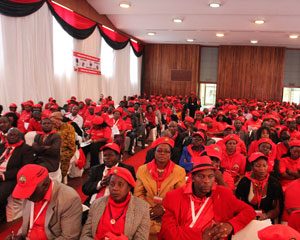
The opposition made a monumental blunder by being frog-marched into an election before all the agreed reforms were implemented, some critics argue.
Sunday Opinion by William
Even Sadc, urged them in Maputo to boycott the election, the argument goes. This premise again is flawed in that it fails to recognise the limitations of democratic apparatus in fighting somebody of Robert Mugabe’s calibre.
The implementation of all the agreed reforms would have helped in levelling the political playing field, but, as we all know, Zanu PF thrives on an uneven playing field.
How then could they sign their own death certificate by reforming institutions they thrive on?
Mugabe needs the military junta for his survival and so does the junta for the extension of patronage. The two have a symbiotic relationship. Mugabe needs the judiciary to protect his interests and so does the judiciary.
Assuming that Police Commissioner Augustine Chihuri and Army Commander Constantine Chiwenga are relieved of their duties in the spirit of security sector reforms only to be replaced by Douglas Nyikayaramba and Martin Chedondo respectively, would that have helped in levelling the playing field?
Assuming that the opposition decided to withdraw from the coalition after realising that their posts in the coalition government were largely ceremonial, who in their right minds would think that Mugabe was to resign or be forced to implement all the agreed reforms, thereby weakening himself?
- Chamisa under fire over US$120K donation
- Mavhunga puts DeMbare into Chibuku quarterfinals
- Pension funds bet on Cabora Bassa oilfields
- Councils defy govt fire tender directive
Keep Reading
In spite of his unsubstantiated claims, who believes that Morgan Tsvangirai had a say in the appointment of Rita Makarau as ZEC’s chair? Assuming that the opposition decided to boycott the 2013 elections, who would believe that Mugabe was to postpone the elections until all the agreed reforms were implemented?
What other strategies could the opposition have made use of to force Mugabe to implement all the agreed reforms after boycotting the poll and at the same time stop him from going ahead with his plan of rigging it? Many critics come to the criticism of the opposition but do not have answers either.
Arthur Mutambara hibernates in the wilderness and will soon emerge to endorse Mugabe. How many like him have been waiting to navigate the direction of the wind before endorsing the winner? Typical of a hypocrite and an amateur, Lovemore Madhuku still dwells in the comfort of the past as he sticks to the constitution mantra which he knows best.
Not to be outdone, Munyaradzi Gwisai and Raymond Majongwe have joined the bandwagon in attacking the opposition in an attempt to seek publicity and relevance.
Can Majongwe convince me how Mugabe, the chief architect of the health and education sector demise, be trusted to resuscitate the same institutions?
If Mugabe failed to remunerate teachers favourably for the past 33 years, what gives Majongwe confidence that this time around, things will change for the better? Zimbabwe has many educated people like Madhuku, Gwisai, Jonathan Moyo, Tafataona Mahoso and many others, but their education fails to translate into wisdom that advances the interests of society. Instead, these intellectuals become the subject of scorn as they fail to live up to the expectations of society.
That being said, what many critics fail to highlight in their criticism of the opposition are the limitations of democratic apparatus in fighting an entrenched dictatorship.
Joshua Nkomo, Mugabe, Ndabaningi Sithole and other nationalists resorted to armed struggle after realising the shortcomings of democratic apparatus in fighting dictatorship. Doesn’t Mugabe boast that the bullet is mightier than the pen? Hosni Mubarak of Egypt and Ben Ali of Tunisia never gave up power voluntarily.
Freedom is a product of sacrifice and those who need it cannot expect to get it on a silver plate.
To the north in Egypt today, the Muslim Brotherhood are still camped in Nasar Square demanding the reinstatement of Mohamed Morsi. They have been singing and dancing in the scorching heat day and night for over a month now.
What energises and inspires them is the conviction that they are fighting for a just cause and that they are their own liberators. Are Zimbabweans prepared to make such sacrifices, or like Madhuku, Gwisai, Majongwe and others, opt for the safer and easier option of attacking Tsvangirai in their bid to salvage their political fortunes?
Tsvangirai or Ncube might leave the political stage and pass on the baton to others, but, as long as there is a failure to understand these democratic limitations, the end result would be the same. These challenges are not only unique to Zimbabwe, but are common to most third world nations where democracy is still in its infancy.
The opposition’s major blunder was its naivety in going to great lengths to sanitise Mugabe’s soiled image, assuming that he is a born again.
Now it is time to reflect and learn from past mistakes before soldiering on. What should give strength to the opposition is that they have people on their side.











